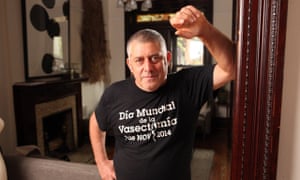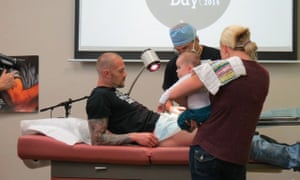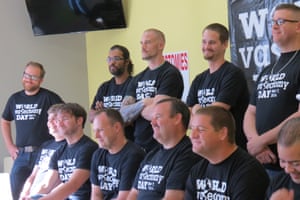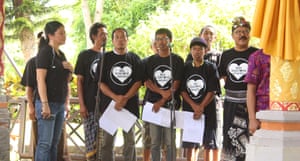In 2009, Mark Lukach came home from his teaching job in San Francisco to find his wife, Giulia, sitting on the carpet, their dog sprawled next to her. He could instantly sense that something was wrong. Then Giulia looked up at him and said: “I can’t figure out what I’m going to do with the Vespa key.”
The couple had a Vespa scooter but Mark didn’t understand. “What do you mean? What would you have to do with the Vespa key?”
“I mean, when I drive to the Golden Gate Bridge,” Giulia replied, “I’ll probably take the Vespa. When I park it, what should I do with the key? If I leave it in the scooter for you, someone will probably steal the scooter. But if I bring it with me, and they don’t find my body after I jump, you’ll lose the only key we have to the scooter.” She looked at Mark pleadingly. “What am I supposed to do with the Vespa key?”
Mark and Giulia met at Georgetown University, Washington DC, in August 2000 when they were just 18. In his book, My Lovely Wife: A Memoir of Madness and Hope, Mark describes the first moment he saw Giulia. It was a coup de foudre: “She was radiant, way out of my league, but I was fearless and almost immediately in love.”

Giulia was highly ambitious and knew exactly how her life was going to pan out: she was going to be a marketing director with three children by the time she was 35. Mark was more laid-back but also knew what he wanted to be: a husband, a surfer and the father of lots of children with Giulia.
Those plans seem a long way away now. Giulia turned 35 earlier this year but her life is nothing like she had anticipated. Her ambitions have shrunk to accommodate her new identity: that of, in her own words, an “ongoing psychotic”.
In 2009, at 27, Giulia had a terrifying and unexpected psychotic break. Hospitalised in a psychiatric ward, she was tormented by delusions and paranoia. When she was released almost a month later, she was diagnosed with schizophrenia and had sunk into an extended suicidal depression during which Mark, struggling to support Giulia, exhausted himself trying to keep his wife safe, follow doctor’s orders, while keeping the job on which the family’s health insurance now relied.
Eventually, Giulia fully recovered and the couple had a son. But soon after he was born, Giulia had another breakdown and was diagnosed as bipolar. She had her third episode a few years later: in 2014. Pushed to the edge of the abyss, the couple’s golden present and glittering future, which they had taken for granted, was transforming into a harrowing reality.
It has been two and a half years since Giulia’s last episode but although she is on daily medication and has a team of psychiatrists and therapists fighting to preserve her delicate mental health, she and Mark know that it is improbable that she will fully recover. The family have to be on permanent alert in case she sinks into psychosis again.
“It’s just so crazy what happens to you in the psych ward that you just don’t want to live afterwards,” says Giulia. “Each time, I have had to start over with my job, and put on hold plans to get pregnant again. Hospitalisation disrupts everything and you have to start from scratch. If I’m being honest, I don’t know if I have the strength to do that one more time.”
Mark is silent. I ask how hearing that makes him feel. “It’s terrifying to hear but I’m not surprised,” he eventually says quietly. “I have seen three times how hard it is for Giulia to process these breaks. I do worry that she’s been able to process three but how about the fourth, fifth, sixth and so on? If you keep breaking your arm in the same place, your arm gets weaker and weaker. The same applies to your mind. I have a lot of admiration for her strength but can’t help having that nagging worry that she will not be able to keep recovering.”
My Lovely Wife is not Giulia’s story but Mark’s. It is the compassionate and deeply honest account of how a husband copes when he is forced to become the carer for an ongoing psychotic wife, a young son (he will be five next week), while being his family’s main breadwinner.
“My greatest sadness is that at times, I wasn’t strong enough to be a father to my son and I had to let him down, or take him to stay with his grandparents,” Mark says. “I never thought that would be a consequence of being a carer. It still brings me to tears when I talk about it.”
Mark wrote the book to fill the void he discovered when, battling to get through his trauma, isolation and despair, he searched for support. “I couldn’t find any voices out there speaking to my experience,” he says. “I learned a lot about her and her symptoms and diagnoses, but there was nothing for me. No resources at all.
“An example of the lack of support is that the maximum my health insurance would offer me was one 30-minute session once a month. I was appalled. What was I supposed to do? Who was listening to me? It felt like I was the first one going through this, which is obviously not the case. The message was that the healthy one is not supposed to need help. I was supposed to be fine. I was on my own.”
Mark also had to readjust his idea of what a relationship was. “I have a really strong belief that relationships should be equal: that the effort one person puts in, needs to be balanced by an equal amount of effort being put in by the other partner. But I do so much caring for Giulia when she’s sick that that reciprocity becomes imbalanced.”
Mark admits his expectations led to a lot of tension after Giulia’s first episode. “It was like he was seeking retribution from me for my having got sick,” she says.
Mark admits this is true: “My expectations after the first episode were that she should ‘pay me back’ for the extra caring I put in when she was ill,” he says. “It created a lot of tension. Our marriage hit a very rocky patch partly because of that.”
It’s different now, Mark says. “It’s not that I do X for her, so she has to do X for me. Now it’s that we have to care for each other as much as we can at any given moment, and I’ve accepted that for periods of time, Giulia isn’t able to care for me or our son. That doesn’t put her in deficit.”
Nevertheless, Giulia admits she has learned a lot from reading Mark’s book. “For the first time, I was able to get into his shoes and see how awful it was: how scary it was for him, being a dad and being the best dad when his wife was in the psych ward. We’d talked about it already but reading it made me experience my illness from his perspective. The loneliness really came through,” she says.
But, ultimately, Giulia says, this book is about love. “This book is pretty much a love letter Mark has written to me,” she said, struggling to hold back the tears. “And it’s the gift that we can give to the world.”
Mark’s ultimate message to anyone who finds themselves in a situation that resembles his own is clear. “Without a doubt, you have to take care of yourself as a carer,” he says. “My first impulse was to put absolutely everything into trying to help Giulia and not pay attention to my needs at all.
“I felt that doing anything for myself was selfish and not good for Giulia. But I’ve learned that that’s how carers burn out, and then they’re no good to anyone,” he says. “So now, I continue to prioritise being active and being the best teacher and writer I can be, despite Giulia’s mental health.
“We’ve said we don’t want her to have another episode but have had to prepare ourselves for one, and this is part of that process,” he adds. “Keeping myself at the top of my game means that if – or, rather, when – Giulia has another episode, I will be able to be the best husband and best father I’m able to be for us all.”
• My Lovely Wife: A Memoir of Madness and Hope is published by Macmillan, £16.99. To order a copy for £14.44, go to bookshop.theguardian.com or call the Guardian Bookshop on 0330 333 6846. Free UK p&p over £10, online orders only. Phone orders min. p&p of £1.99.
In the UK, the Samaritans can be contacted on 116 123. In the US, the National Suicide Prevention Hotline is 1-800-273-8255. In Australia, the crisis support service Lifeline is on 13 11 14. Hotlines in other countries can be found here
‘She was radiant, way out of my league’: a story of love and mental illness




